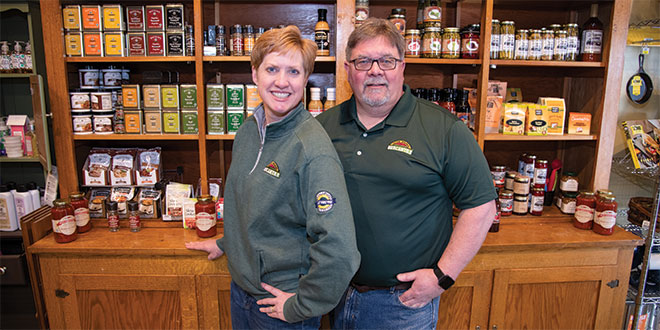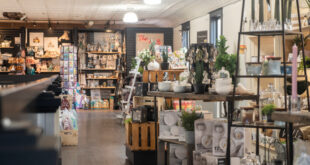Gourmet foods, local gifts, unique home goods, custom cabinets, firearms, live bait, microbrew beer, even frozen pizzas— there’s no shortage of variety alongside the core hardware categories at Solon Springs Mercantile.
Owners Meg and Ken Thoreson have built up a diverse mixture of successful niches alongside their hardlines offerings at their store in Solon Springs, Wisconsin. Those niches give their customers more reasons to stay in town to shop and make up nearly 50 percent of the Thoreson’s annual sales.
Niche categories can improve your margins and increase your average transaction size. Rather than detracting
from your core sales, offering unique products outside of traditional hardware lines can add excitement to your business and diversify your customer base. As you will see on the following pages, the possibilities are endless.
But managing a niche category successfully is part artful intuition, part retail science. You don’t always follow
the same rules you do with the rest of your inventory. Hardware Retailing spoke with three retailers who have built up diverse niche categories and gathered years of wisdom on what it takes to make them successful. Let their insights guide and inspire you as you look for something new for your own operation. Click here for more photos from these stores.
A Local Experience
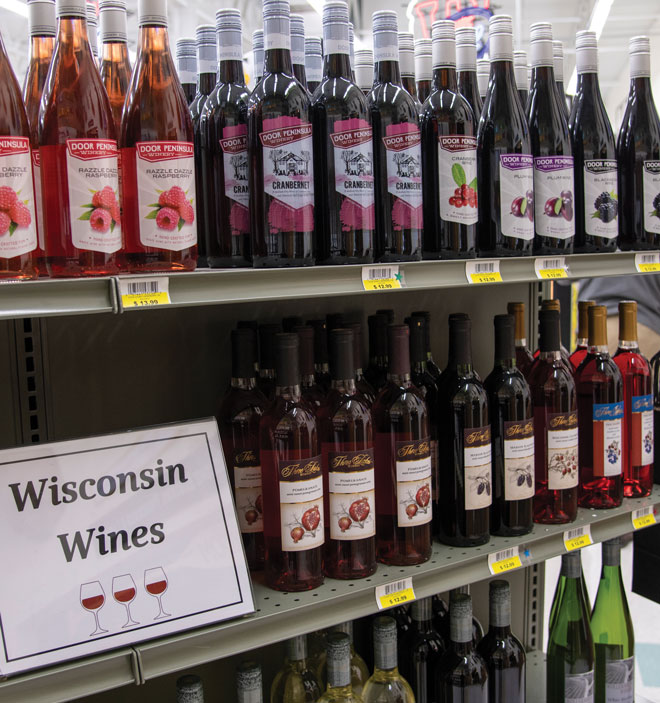
Solon Springs Mercantile
Solon Springs Mercantile sits in the vast Northwoods region that stretches across the upper Midwest and into Canada. The area provides a haven for outdoor enthusiasts and seasonal residents who seek an escape from city life at their lake homes and cabins. As owners of the only hardware store in town, the Thoresons enjoy a mix of customers who are looking for home necessities along with those “want” items.
But getting to where they are today with an operation that has something for everyone has been a system of trial and error. It started on an early morning in June 2004 with a call no retailer wants to get. Their small hardware store in downtown Solon Springs, which they had purchased only a couple of years prior, was on fire. The fire was devastating, a complete loss.
Thanks to a detailed business plan and a comprehensive insurance policy, the couple was able to rebuild, which they did west of downtown on the main highway. Having operated in a small space in the years prior to the fire, now was the time to build their dream store. The new building would be three times the size of the previous space with plenty of room to experiment with new categories beyond hardware. They started by taking a three-day road trip to retailers in the Northwoods area.
“We made a list of everything we liked about the stores we visited and began looking at what we could do with our own,” says Ken. “We knew from the beginning we wanted to get into sporting goods, so that became our first new category.”
It remains a profitable one, too. A Northwoods outdoor lifestyle theme dominates the store. With 18,000 square feet inside and ample land around them, they had the luxury of space they would use to experiment. Some of those experiments worked, some of them didn’t, admits Ken, but he never regrets at least giving something new a try.
For example, there is a small room just off the main salesfloor, perfect for a store-within-a-store concept. The Thoresons tried a few ideas there, including a working display kitchen suitable for cooking demonstrations and a coffee shop. Those ideas may have worked well for other retailers, but they just never caught on in Solon Springs.
Today, that area houses the St. Croix Room, a variety of gourmet foods, unique gifts, home goods and clothing, all with a local flavor that appeals to the outdoor enthusiast. Meg brought in furniture pieces from their own home as merchandisers to create a unique area within the store.
“What we put in that room changed a number of times, but we finally found something that is working really well,” says Ken.
Another popular section is 1,000 square feet of wine and spirits. On the shelves are local wines and a 40-foot run of beer coolers featuring microbrews from Wisconsin.
“We were looking for a high-traffic item, and we didn’t want to get into perishable goods,” Ken says. “We have a larger selection than a convenience store or grocery. The margins are low, but the turns are a dozen times more than anything else in the store. It pulls in more gross sales than most other categories.”
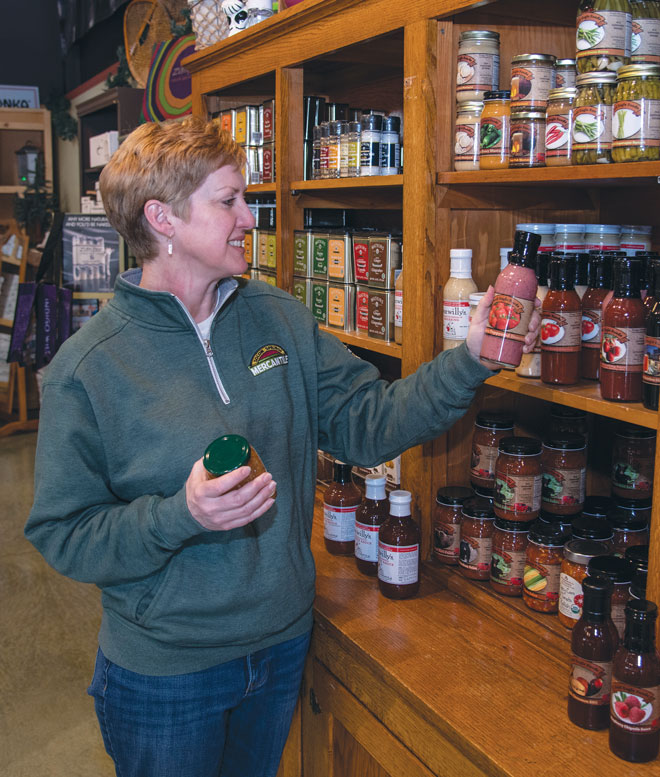
With some niches, vendors can do the bulk of the work, saving Ken space on the salesfloor. For example, no retailers around Solon Springs sell custom kitchen cabinetry. Ken works with a company that provides design services for customers wanting cabinetry for their home or cabin. He only needs a small amount of floor space, enough for a table to discuss the plans and a few cabinet samples. After cabinetry is ordered, he can make recommendations for local installers.
“With the cabinets, we don’t have a lot of money tied up in inventory,” he says. “Cabinets come in the backroom and go right back out to the customer.”
Portable buildings have been another rewarding niche that don’t require much inventory. Buildings are prebuilt at the manufacturer then delivered
to the customer. Ken has 15 buildings on-site as samples supplied by the company, but the options are virtually endless, ranging in size from sheds to small bunk houses.
With nearly one-third of the salesfloor dedicated to niche categories, searching out the next niche has become as critical to the success of Solon Springs Mercantile as managing the core categories. For the Thoresons, that means they’re willing to try something new, even if it doesn’t work out. It’s important to keep trying.
“There are really no bad ideas,” says Ken. “There are so many possibilities. Don’t be afraid to try something different and see what happens.”
Finding Your Niche
- Be First In, First Out
The Thoresons try to be the first in their market to sell a unique product, then move on when it goes mainstream. “If we see mass merchants start to sell a niche product we’re selling, we actually might decide to get out of it,” says Meg. “The item’s velocity also gives us an idea of when it’s time to get out.” - Double Your Money
Niche products may not carry the same price sensitivity as other items you sell. “We’re looking for those items where we think we can double the cost,” says Meg. “If we don’t think we can do that, we might not try selling it at all. That means having a good idea about what your market will support.” - Minimize SKUs
The Thoresons look for niches with a low SKU investment, without a large matrix of sizes. Fewer choices are better. “A lot of sizes and colors tend not to work well for us because there are so many choices for the consumer and there might be several of those SKUs we can’t sell,” says Ken.
Tourist Destination
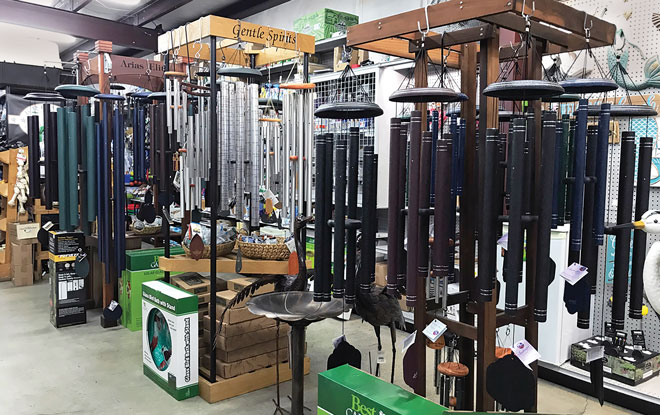
Hall’s Hardware & Lumber
One of the prized possessions found at Hall’s Hardware & Lumber in Milton, Florida, is a U.S. map with pins showing the many places their customers call home. There are thousands of pins on the map, dotting every state. In addition, the store claims visitors from more than 15 countries worldwide. Many of those guests are tourists, visiting the Florida panhandle for recreation or to visit family working at the naval air station located in Milton.
The store has as much appeal to the wandering tourist as it does to locals working on a project around their home. Customers love the old-fashioned general store atmosphere. Co-owner Wade Allen counts more than 25 different areas he would classify as niche among the aisles of plumbing and electrical, hardware and fasteners. There is something sure to appeal to anyone, whether it’s vintage clothing, handtuned wind chimes or military-style backpacks.
“When someone new comes to town, their friends or neighbors tell them all the places they need to visit. They always say, ‘Make sure you get over to Hall’s Hardware,’” says Allen, who along with his brother Brad, runs the business. “We average about 40 first-time visitors every week. They’re easy to identify, too. They usually are in awe and maybe overwhelmed at all of the different types of products we have. We want people to have fun here.”
Hall’s Hardware & Lumber has been in business since 1960, but it wasn’t until about 10 years ago that Allen became more intentional about creating a distinct brand. He hired a full-time marketing specialist who maintains the store’s social media, writes a quarterly customer newsletter, organizes the knife club, runs the rewards program and coordinates a new mover’s program. First-time guests to the store get a gift bag with a welcome letter, a koozie, Hall’s Hardware coupons and a coupon for a free vintage soda from the store.
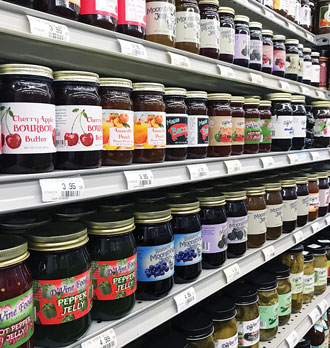
One of the popular areas is in the outdoor living department where Allen’s wife manages a large collection of wind chimes. Rather than just the standard assortment of chimes someone might hang on their front porch, customers shopping Hall’s can find more than 100 different varieties of all sizes, colors, styles and price levels. Allen says they sell more than 1,000 wind chimes a year, including hundreds of the handtuned chimes, which usually cost the most. Christmas is the category’s biggest season, when many sales come from the store’s popular Christmas Open House events.
Military supplies have also been a popular niche. Being home to Naval Air Station Whiting Field, Milton has a strong military presence, so military gear appeals to many customers who already shop at Hall’s. That niche has changed significantly over the years in response to changing customer needs, but Allen says it has helped open opportunities for new customers.
“I’ve sold everything from night-vision goggles to military-style bags and belts. At first, I sold a lot of clothing and combat gear to law enforcement and correctional facilities,” he says.
When clothing sales slowed down because those facilities began issuing their own clothing, Allen replaced clothing with other law enforcement gear. Students often want the military-style bags for everyday use and some of the clothing and tactical equipment is popular with hunters and survivalists.
Customers who shop the military supplies section usually stop by Hall’s extensive knife collection, too. Allen has a deep selection, ranging from collectibles to military-grade knives. He focuses on two major brands popular with collectors. Brand usually plays a key role in any sale, so he makes that a major part of his marketing. There is something for everyone’s level of interest, and the popular knife club encourages customers to be repeat visitors. Anyone can join the knife club, and once they’re on the list, they get invited to have a first look at new knives Allen brings in and get a first chance at discounts.
Another popular niche is in the houseware’s department where customers will find high-end cookware, kitchen gadgets, gourmet foods and outdoor cookware. They will also find gifts, a wide selection of pet supplies and 100 linear feet of dollar items. Those wanting to step back in time can find vintage toys, sodas, candies, clothing and handbags. For Allen, those niches have grown out of the particular interests of himself and his staff.
“Get out of the hardware mindset for a moment and look for something to make the store fun and keep customers there a little longer. You don’t want them to just grab what they need and leave.”
Finding Your Niche
- Watch Trends
Unlike ordering hardlines, which operate off order points, many niche items revolve around trends and need to be managed on a case-by-case basis. “The computer doesn’t tell you when to order niches,” says Allen. “When managing niches, you can’t just bring something in and leave it.” Some products have a short shelf life. In the giftware department, for example, the manager will typically reorder a particular product once and then close it out. - Upscale Your Merchandising
When selling niche items, dump the standard shelving. “We try to have things displayed on glass or wood shelves, as it has to be displayed well,” Allen says. “Fifty percent of my business in many of those niche categories is with women, and if they’ve visited other stores where merchandise is displayed nicely, they’re going to expect it here.” He is fortunate to have a store manager gifted with visualizing and creating effective merchandising. - Learn From Others
Allen attends many specialty shows each year, including many focused on gifts. He goes to scope out new items, particularly ahead of Christmas. He learns a lot by talking with other retailers, too, asking them what products are working well for them. In addition to attending wholesaler shows, look for specialty shows that correspond to the niche you’re selling. You’re likely to see vendors that can help you in your desired category.
Furnishing the Home
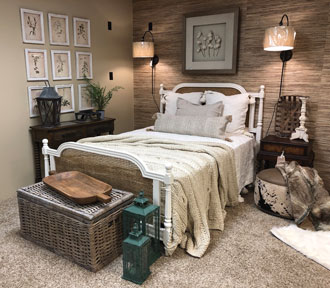
Reeves Ace Hardware
There are not too many towns where a bride-to-be makes a beeline for the local hardware store to register for wedding gifts. That’s what happens at Reeves Ace Hardware in Clayton, Georgia, where you can do more than just fix your home; you can furnish it as well. The store’s furniture department has been a part of the business for 30 years, and once they’ve picked out a new table or chair, shoppers can look for window treatments, housewares and table settings. Outdoor enthusiasts in town for a fishing trip will find all manner of sporting goods, including a fly-fishing shop. Other customers may be artists looking to put the scenery to canvas. For them, Reeves has several aisles stocked with artist paints, canvas and accessories. Throughout the rest of the store are toys, locally made food items, a large selection of guns and knives and major brand name outdoor wear.
A fourth-generation operation started in 1928, Reeves Hardware Co. has five locations: four in northern Georgia and a fifth in North Carolina. Each has its own unique product mix, and some include a farm and feed store and a building supply outlet. Meredith Thompson is the manager of the home furnishings department at the Clayton location, where the quaint store covers half a block.
Clayton is nestled in the Blue Ridge mountains, so many of the customers are tending to their cabin retreat. Thompson tailors her furniture purchases accordingly, tending toward unique, upscale pieces.
“These are not items you can pick up at your local department store,” she says. “We buy as much Made in America pieces as possible, even though it’s difficult to find American furniture anymore. While some of that may be more expensive, it’s also a higher quality and will last longer. Our selection is curated to focus on the mountain retreat feel and the second home market.”
If she’s selling a bed, Thompson can sell a mattress too. She offers a line of made-to-order mattresses manufactured in Greenville, South Carolina.
Like the furniture, she feels offering a higher quality product that is made in the U.S. plays well with her customers. But she doesn’t take her place in the market for granted. For many years, her main customer was the older generation. Today, she’s using Instagram to reach out to the younger generation, who may not be used to spending a little more to furnish their home. She emphasizes the quality of the furniture she carries in hopes of winning a new customer.
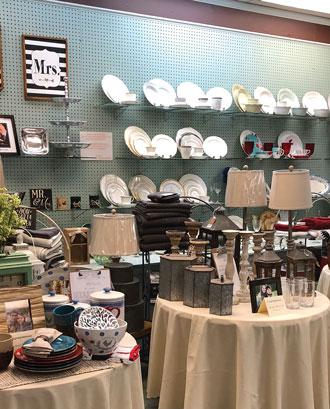
Because the store has so many diverse offerings, Thompson says their bridal registry stays busy spring through fall. The store offers something for both bride and groom, whether it’s a new set of table linens or a chainsaw, a fishing pole or a set of tableware. But where many stores with a bridal registry simply publish the couple’s wish list, Reeves sees an opportunity for some creative merchandising. Each couple gets their own table in the store. In addition to the published list, the table holds some of the highlighted items the couple has chosen.
“What those brides pick out is on that table,” says Thompson. “It helps people see the options of what they can buy for the couple and really shows their personality. There are times in the summer when we’ll have 10 to 12 tables at one time.”
And as long as they have the happy couple in the store, why not rent the groom his tuxedo? Last year, Reeves started offering tuxedo rental. Since the store is in a small town, anyone wanting to be fitted for a tux would need to drive an hour to the nearest shop. Now, Reeves can take the measurements and have the suit and shoes delivered in a few days.
“We get a lot of business during prom season,” says Thompson. “The tuxedos give us a good margin and there’s not a lot of inventory, just a few samples so customers can see the quality of the tux and the shoes.”
Whether they’re selling home furnishings, artist supplies, fishing lures or a can of chili from a local celebrity chef, Reeves focuses on diversity.
“We have a huge inventory because we’re trying to offer something to everyone,” says Thompson. “We want to make sure we’re not segregated to one particular type of homeowner, price point or style. We try to be very diverse.”
Finding Your Niche
- Clear It Out
To keep niches fresh, twice a year, Reeves has a sale to discount all of the odd sizes, out-of-season styles or other inventory they can’t sell. “It’s better to get a little bit of cash than have it taking up space,” says Thompson. “It’s important to keep the inventory moving so our categories don’t get stale.” - Do Your Homework
Do a little research before buying from a new vendor. “You might see something that looks good in a catalog, but it doesn’t look so great when it shows up in your store,” she says. “We’ve learned to ask a lot of questions.” Ask for referrals from other retailers who have sold the product. - Treat Employees Well
As with the rest of the business, enthusiasm goes a long way when selling niches. Thompson says employee attitude is a big contributor to the success of their business. “If you treat your employees well and build a good team, they will work well for you and treat the customers well,” she says.
 Hardware Retailing The Industry's Source for Insights and Information
Hardware Retailing The Industry's Source for Insights and Information



